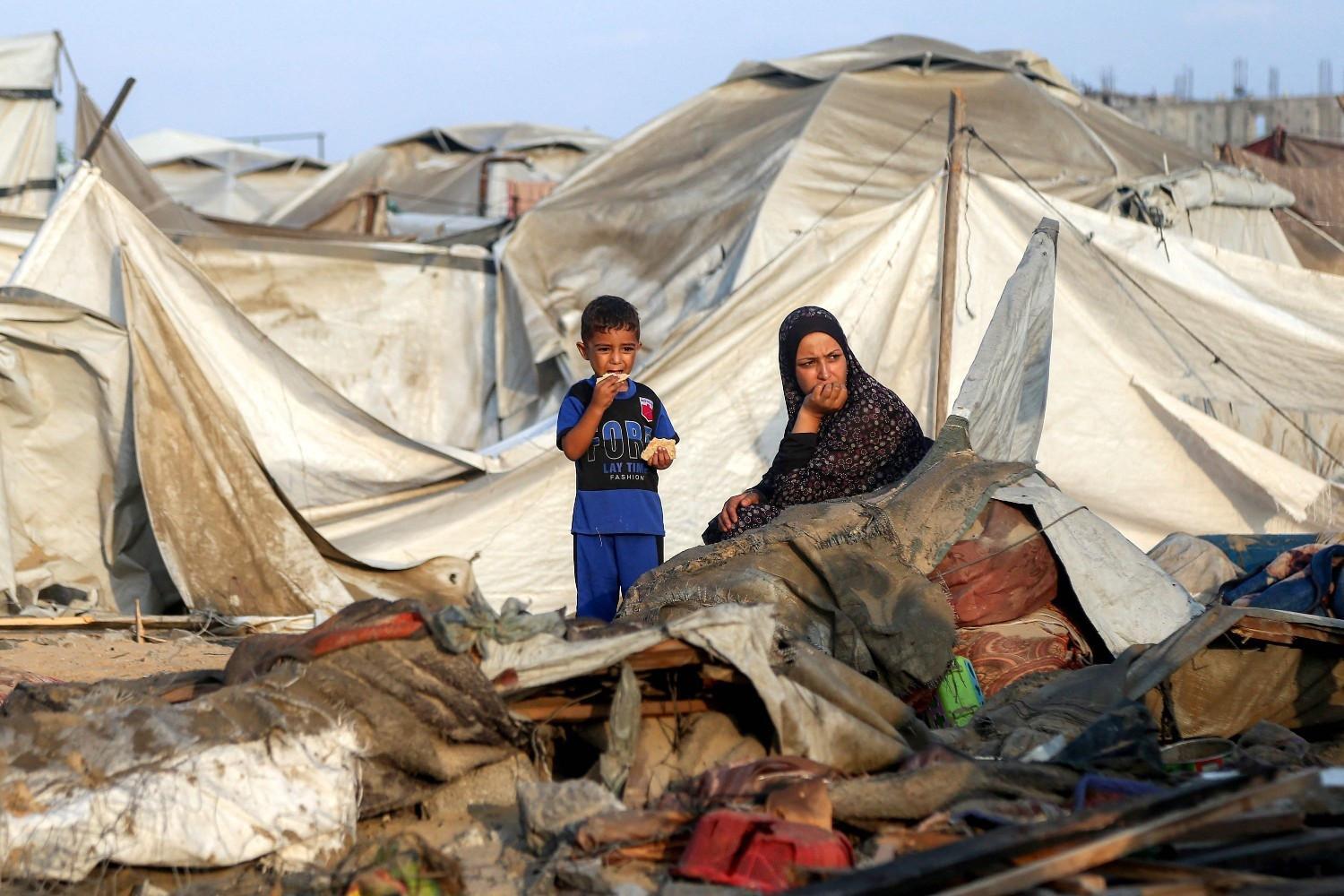
A woman and a boy sit by debris and destroyed tents following overnight Israeli bombardment at a camp sheltering the displaced in the Japanese neighbourhood in the northwest of Khan Yunis in the southern Gaza Strip on July 28, 2025. (Photo by AFP)
U.S. President Donald Trump warned on July 28 that Gaza faces "real starvation," directly challenging Israeli Prime Minister Benjamin Netanyahu's denial of a humanitarian crisis, as Israeli forces killed at least 92 Palestinians in the territory, including 41 seeking aid, rising the death toll to at least 59,921 people.
Israeli human rights groups B'Tselem and Physicians for Human Rights issued reports on July 28 accusing Israel of committing genocide in Gaza, citing deliberate starvation tactics. Amnesty International echoed this, pointing to evidence of starvation used as a weapon against civilians.
The latest violence included an Israeli settler shooting dead Palestinian activist and teacher Odeh Muhammad Hadalin in Masafer Yatta, occupied West Bank.
In Gaza, strikes targeted areas despite "tactical pauses" meant for aid delivery.
Aid agencies sought to take advantage of an Israeli "tactical pause" of some military operations to rush in food aid.
Speaking in Scotland, Trump contradicted Netanyahu, who has dismissed famine fears as Hamas propaganda.
Trump said the United States and its partners would help set up food centers to feed the more than two million Palestinians in Gaza facing what U.N. aid agencies have warned is a deadly wave of starvation and malnutrition.
"We're going to be getting some good strong food; we can save a lot of people. I mean, some of those kids—that's real starvation stuff," he said at a news conference with U.K. Prime Minister Keir Starmer. "We have to get the kids fed."
Trump's remarks came after Netanyahu declared on Sunday that "there is no starvation in Gaza, no policy of starvation in Gaza."
U.S. food centers
The United States already backs food centers under the Gaza Humanitarian Foundation, but the GHF's operations have come under repeated criticism, with the U.N. saying hundreds of Palestinians have been killed by Israeli troops while trying to access its sites.
The Foundation has also been accused by aid groups of facilitating Israel's military goals.
Trump said the U.K. and European Union would back new food centers that would be easier to access. "where the people can walk in, and no boundaries."
The war in Gaza has dragged on for almost 22 months, creating a dire humanitarian crisis exacerbated by an Israeli blockade on supplies imposed from March to late May.
The easing of the blockade coincided with the beginning of the GHF's operations, which effectively sidelined Gaza's traditionally U.N.-led aid distribution system and which have been criticized as grossly inadequate.
United Nations Secretary-General Antonio Guterres on Monday welcomed steps to reduce restrictions to lifesaving aid but said it "is far from the solution to end this nightmare."
In recent days, the U.N. and humanitarian agencies have begun delivering more truckloads of food after the Israeli military declared a daily "tactical pause" in the fighting and opened secure aid routes amid mounting international outrage.
Jamil Safadi said he had been getting up before dawn for two weeks to search for food, and Monday was his first success.
"I received about five kilos of flour, which I shared with my neighbor," said the 37-year-old, who shelters with his wife, six children, and a sick father in a tent in Tel al-Hawa.
Other Gazans were less fortunate. Some complained aid trucks had been stolen or guards had fired at them near U.S.-backed distribution centers.
"I saw injured and dead people. People have no choice but to try daily to get flour," said 33-year-old Amir al-Rash.
Israel's new tactical pauses apply only to certain areas and Gaza's civil defense. The agency reported 54 people killed in Israeli attacks on Monday.
The Israeli defense ministry's civil affairs agency, COGAT, said the U.N. and aid organizations had been able to pick up 120 truckloads of aid on Sunday and distribute it inside Gaza, with more on the way on Monday.
Basic supplies
Jordan and the United Arab Emirates have begun airdropping aid packages, while Egypt has sent trucks through its Rafah border crossing to an Israeli post just inside Gaza.
Germany on Monday said it would work with Jordan to airlift aid for Gaza and coordinate with France and Britain.
The U.N. agency for Palestinian refugees, UNRWA, cautiously welcomed Israel's recent moves but warned Gaza needed at least 500 to 600 trucks of basic food, medicine, and hygiene supplies daily.
"Opening all the crossings and flooding Gaza with assistance is the only way to avert further deepening of starvation," UNRWA said.
Netanyahu has denied Israel was deliberately starving civilians, but on Monday two local rights groups, B'Tselem and Physicians for Human Rights, accused the country of "genocide"—a "first for Israeli NGOs.
The amount of aid entering the territory still falls far short of what is needed, say experts, who have called for a permanent ceasefire, the reopening of more border crossings, and a long-term, large-scale humanitarian operation.
"We're one and a half days into these new measures. Saying whether or not it is making a difference on the ground will take time," Olga Cherevko, a spokeswoman for the U.N.'s humanitarian agency, told AFP from Gaza.
The war in Gaza was sparked by Hamas's October 7, 2023, attack on Israel, which resulted in the deaths of 1,219 people, most of them civilians, according to an AFP tally based on official figures.
Israel's retaliatory campaign has killed 59,921 Palestinians, also mostly civilians, according to the health ministry in the Hamas-run territory.